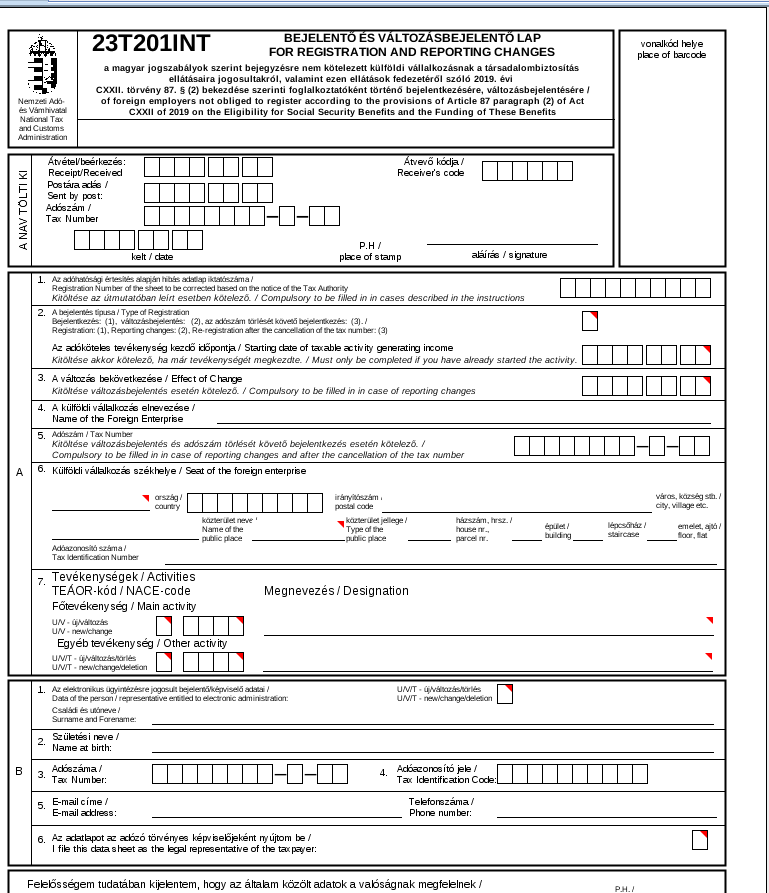When a foreign enterprise is present in Hungary, and if it has created an establishment in the country based on the provisions of the Corporate Income Tax Act and/or the double taxation treaty between the country of residence of the foreign enterprise and Hungary (for example, because the managing director resides in the country or has an employee or freelancer working remotely from their home in the country), the foreign enterprise might become liable for registration in the country. The question is whether it is possible to register for just tax purposes, i.e. without registering an entity, and if so, how the foreign enterprise will fulfill its income tax obligations, as well as what records need to be maintained.
There is a difference between a branch and an establishment.
A branch is an entity created in a country by a foreign enterprise and is established through company registration. Therefore, a branch will be subject to companies law and may acquire rights and undertake obligations for the foreign parent company. The branch is practically taxed just like a domestic company.
The concept of an establishment is broader than that of a branch. In international taxation, the branch is just one type of what is considered an establishment. Double taxation treaties essentially allow foreign enterprises to not have to register a branch in the other country. Enterprises from countries covered by the relevant treaty can, under certain circumstances, engage in economic activities in the other country without necessarily establishing a branch.
So, if a foreign company does not have a branch registered in Hungary, it should be examined whether it has created an establishment through its presence in the country.
An establishment can be eg. a factory, an assembly facility, a retail store, the company office, a construction site and even the home of a teleworker. It also creates an establishment if an employee of a foreign company regularly concludes contracts on behalf of the company in Hungary.
If the foreign enterprise has a premise in Hungary where it employs employees, and these employees contribute substantially to the economic activity of the foreign employer, then this place will most likely qualify as an establishment.
But you need not necessarily have an office on your name to qualify as having an establishment, you also qualify through having an employee or a freelancer working for your from his/her home in the country. According to the Corporate Income Tax Act an establishment is also created by a foreign enterprise in Hungary through the provision of services through a natural person employed by a foreign person as an employee or performing the same activity in another legal relationship with that foreign person, provided that the provision of the service continuously or with interruptions exceeds 183 days in any twelve-month period, provided that connected and related services must be taken into account together.
A non-resident company will become liable for income taxes in Hungary if the company has created an establishment in the country under the provisions of the double taxation treaty between the country of residence of the company and Hungary. If the foreign enterprise is resident in a country with which Hungary has no valid treaty, the foreign enterprise will be subject to the provisions of the corporate income tax law, i.e.:
- if there is a double taxation treaty in force between the country of the said enterprise and Hungary, the foreign enterprise will become subject to income taxes in Hungary according to the provisions in that treaty
- if there is no such agreement, the provisions of the Corporate Income Tax Act will apply from day 1.
The establishment, unlike the branch, does not have to prepare and file annual financial reports in Hungary, i.e its tax liabilities will be determined on the basis of other registers.
If a foreign enterprise becomes liable for income taxes in Hungary, this liability will include corporate income tax, local business tax, innovation fee and even VAT under certain circumstances.
When calculating income taxes payable in Hungary, all revenues and expenses directly related with the establishment must be taken into account, as if the establishment was an independent entity.

